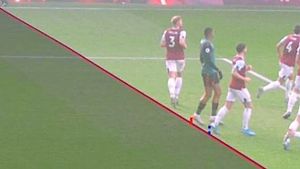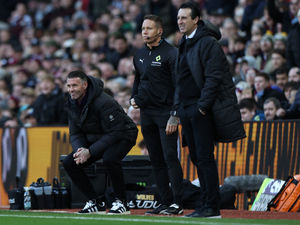Matt Maher: It’s far from perfect, but VAR is not the death of football
There is no other team in American football to have suffered so much heartbreak in recent years as the New Orleans Saints.
In each of the last three seasons they have experienced agonising, last-gasp play-off defeats, the latest of which came on Sunday when they were beaten in overtime by the Minnesota Vikings, despite having gone into the game as big favourites to progress.
For the second year running, there was huge controversy about the finish, with Saints defender PJ Williams appearing to be fouled by Minnesota’s Kyle Rudolph moments before the latter caught the game-ending touchdown.
Just 12 months previously, a foul missed by the officials in New Orleans’ defeat to the Los Angeles Rams was so egregious it led to a change in the rules allowing such incidents to be reviewed by the video referee and, if necessary, overturned.
So, on Sunday night, there will have been many Saints fans who, having seen the initial replays, sat back in confidence a foul (or penalty, to use the correct American phrase) would be given against Rudolph, the winning score chalked off and the game allowed to continue with their team still in with a shot at victory.
Except that, after the briefest of delays, the video referee radioed down to the on-field officials to tell them no foul had been committed and to stick with their original decision. All of which meant the latter left the field to loud boos, while trying to dodge a barrage of plastic cups being thrown by an increasingly angry fans.
Watching it all unfold and reading the subsequent explanations from the officiating authorities, it felt difficult not to draw comparisons to events closer to home and the ongoing issues with VAR in the Premier League.
After all, supporters of the technology will often point to the NFL as an example of where video replay works effectively, whereas in reality all it actually proves is that no matter how many times you tweak the system, you will never find a solution to guarantee the correct results all of the time, not when there is still a human in charge of the machine.
It is something worth keeping in mind whenever it is claimed VAR will work just fine once all the teething problems are ironed out. That is not to say there aren’t some issues which urgently need addressing.

The folly of allowing decisions to be made by someone sat in an industrial park, sometimes hundreds of miles away from the match, should have been recognised and rectified by PGMOL several months ago.
Yet the inconvenient truth is all that smoothing over one issue tends to do is create creases elsewhere, as the deficiencies of a rulebook written deliberately vague in order to factor in human error become readily exposed.
The larger issue is less with how the technology is implemented but more with the fact it can never deliver the clarity upon which it was sold.
Take offside, for example. The notion VAR would only be used to address errors which were ‘clear and obvious’ was never going to work around a law where it is possible to establish a definitive answer.
A player who is offside is, after all, offside, so you can hardly blame the authorities for pursuing a system which makes sure decisions are correct, right down to a few millimetres. In practice it has, of course, been a farce, leading to lengthy stoppages while lines are drawn on a screen and more discussions about armpits than you ever thought possible.
Having set off in search of perfection, we instead find ourselves in a bizarre situation, at least where offside is concerned, of decisions being criticised for being too perfect.
Incidents such as Jack Grealish’s header being chalked off in Villa’s 2-1 win at Burnley last week have led to increased calls for the introduction of a ‘margin of error’ for offside reviews, in a similar fashion to the way ‘umpire’s call’ is used on lbw decisions in cricket.
It seems, on the face of it, a reasonable request.
Yet the question quickly becomes how large should this margin of error be? And are we really to believe, given the scepticism which has greeted so many offside calls thus far, it is a move which would satisfy everyone? To that latter point I think we already know the answer.
One other thing the NFL teaches us is that regardless of any controversy it might cause, video replay does not tend to make a sport less popular.
Infuriating as it might have been to watch and report on VAR incidents this season, almost equally as tiresome have been the hysterical claims it is ‘killing’ football.
It is unlikely any of those who rush to social media to proclaim the death of the sport after every questionable call have cancelled their season tickets or, more crucially, any TV subscriptions.
Only the latter might convince the Premier League to backtrack on their decision to utilise the technology.
Like it or not, there is even an argument VAR has added to the drama.
Of course the delays over the award of Manchester City’s penalty in last month’s match at Wolves, not to mention the subsequent retake, were borderline farcical.
Yet just a couple of hours later, it had played an undoubted part in one of the great Molineux nights of the decade.
There is also the fact many of those criticising VAR were among those who, not so long ago, were shouting the loudest for its implementation, whether they be supporters, players, managers or, yes, even journalists.
The first half of the Premier League season has merely proved VAR is not the magical solution some might have expected.
It was never going to be. Such a thing will simply never exist.





